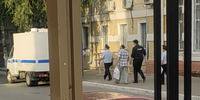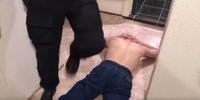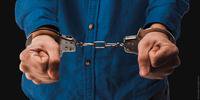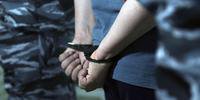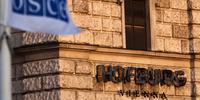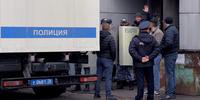The Case of Sokolov and Others in Voronezh
Filter
- #
The 1st Department for Investigation of Particularly Important Cases of the Investigative Department of the Investigative Committee of the Russian Federation for the Voronezh Region initiates 2 criminal cases under Part 1 of Article 282.2 of the Criminal Code of the Russian Federation against 11 believers: Antyukhin Aleksey (44 years old), Sergey Baev (47 years old), Mikhail Veselov (51 years old), Galka Yuriy (44 years old), Gursky Valery (56 years old), King Alexander (29 years old), Nerush Vitaliy (41 years old), Stepan Pankratov (24 years old), Igor Popov (54 years old), Evgeny Sokolov (44 years old) and Anatoly Yagupov (51 years old).
According to investigators, from June 2018 to February 2020, the suspects and other unidentified persons were active members of the local religious organization of Jehovah's Witnesses "Central, Voronezh". It is alleged that they took organizational actions aimed at continuing the activities of the banned religious organization in the city of Voronezh and the Voronezh region.
The case is being investigated by the investigator for especially important cases Ilya Bichev and others, with the active participation of the head of the department Andrey Shevelev. The investigation of the case is under the control of the head of the regional investigation department.
- #
The largest special operation is being carried out against Jehovah's Witnesses: searches are being carried out at more than 100 addresses, including apartments of believers, workplaces, garages, etc. Raids in the cities of Voronezh, Borisoglebsk, Liski, Novovoronezh, Pavlovsk, Ramon, Semiluki, the villages of Nikolskoye and Babyakovo. Investigators of the Investigative Committee together with employees of the Main Directorate of the Ministry of Internal Affairs of Russia for the Voronezh Region, with the power support of employees of the National Guard, participate in the operation.
Some believers have reported beatings. Aleksandr Bokov and Dmitriy Katyrov are severely beaten and abused because they refuse to provide passwords for their mobile devices. Law enforcement officers inflict several blows to the face, head and ribs, after which they force him to do push-ups from the floor and squat until he is exhausted. Law enforcement officers bring Katyrov to Bokov's apartment, demand the password from his device, and after refusal, they knock him to the floor and kick him on the back and neck, break out his hands and fingers to unlock the phone with his fingerprint. Because of what is happening, Bokov's wife needs the help of an ambulance crew. (After interrogation, both believers were released, they record their injuries in order to protest the actions of law enforcement officers.)
29-year-old Alexander Korol is taken away for interrogation. After refusing to incriminate himself and extradite his fellow believers, one of the interrogators tortures him: they put a plastic bag over Aleksandr's head and tighten it around his neck, blocking the access of air. The torture is repeated repeatedly. At the same time, Alexander is beaten in the face several times and threatened with using needles for torture.
During the storming of Yuriy Galka's apartment, after breaking into his front door, law enforcement officers knocked him down and pressed him face to the floor.
The apartment where Aleksey Shtylenko lives with his wife and sick mother is burst into the armed security forces - an investigator accompanied by 2 operatives and 2 riot policemen. Spouses are ordered to lie face down on the floor. The believer is dragged down the corridor and kicked. Law enforcement officers demand to name passwords from phones. Their passports are taken away from them, they are not allowed to get up, get dressed, visit the toilet for some time. After 4 hours, Aleksey is taken out into the yard to search his car, without having the appropriate order and in the absence of witnesses.
The majority of believers, at least 40, including women, are taken for interrogations to the Center for Countering Extremism, to Sredne-Moskovskaya Street in Voronezh. There they are kept in the assembly hall under the supervision of armed machine gunners and interrogated one by one. During interrogations, some are pressured and used foul language. At least one believer is beaten in the back of the head with his palm.
Believers Antyukhin, Baev, Veselov, Galka, Gursky, Nerush, Pankratov, Popov, Sokolov and Yagupov are taken to the building of the Investigative Committee of the Russian Federation on Ordzhonikidze Street in Voronezh. They sit in a paddy wagon, and they are taken one by one to the building, handcuffed to the escort. At night, they are sent to an isolation ward in the village of Nizhnedevitsk.
- #
The Leninsky District Court of Voronezh sends ten believers into custody for 1 month and 22 days (until September 3, 2020). Sergey Baev, Yuriy Galka, Stepan Pankratov, Igor Popov and Anatoly Yagupov are placed in pre-trial detention center No. 3 on Antokolsky Street in Voronezh. Aleksey Antyukhin, Mikhail Veselov, Valery Gursky, Vitaliy Nerush, Yevgeniy Sokolov — in pre-trial detention center No. 1 on Zhelyabov Street.
- #
- #
The UK Mission to the OSCE issued an official statement saying, among other things: "It is with deep regret that we learned that on 13 July, Russian authorities simultaneously searched 110 homes of Jehovah's Witnesses in the cities of Voronezh and Stary Oskol. 13 Jehovah's Witnesses were detained and two people were reportedly beaten during a home search. [...] For three years now, the delegation of the Russian Federation has assured the OSCE that individual Jehovah's Witnesses can practice their religion at home, as no permission is required to pray in Russia. However, we have witnessed time and again that in the case of Jehovah's Witnesses, any manifestation of their faith can result in the search of their homes, lengthy detention, criminal prosecution and imprisonment."
Anatoly Yagupov, Yuriy Galka and Igor Popov are transferred to the FKU "SIZO No. 1 of the Federal Penitentiary Service for the Voronezh Region" at 56 Zhelyabova Street, Voronezh.
- #
During a visit to the detainees in pre-trial detention center No. 1, the lawyers learn that two more believers — Yuriy Galka and Anatoly Yagupov — were tortured and beaten. During interrogations, they put a bag over their heads, demanding self-incrimination. At the same time, Yuriy Galka was beaten by the security forces in such a way that he broke a rib.
- #
The Leninsky District Court of Voronezh changes the measure of restraint for Sergey Baev to house arrest.
- #
- #
The Voronezh court decides to release Anatoly Yagupov from the pre-trial detention center under house arrest.
- #
- #
The Leninsky District Court of Voronezh is holding hearings in the case of Yevgeny Sokolov, Vitaliy Nerush, Yuri Galka and Mikhail Veselov. Due to the epidemiological situation, only relatives of the accused are allowed to attend the hearing.
Judge Aleksandr Kuryanov, who at the end of 2016 issued a decision to suspend the activities of the LRO of Jehovah's Witnesses in Voronezh, begins consideration of Sokolov's case.
The court satisfies the defense's requests to familiarize the accused with the case materials, to attach the opinion of the UN Working Group on Arbitrary Detention and to attach other documents confirming the possibility of applying a measure of restraint in the form of house arrest, but refuses to release the defendant from the cage for the duration of the trial.
Yevgeny Sokolov does not recognize the connection with extremism and emphasizes that, as a Christian, he respects the authorities.
The hearing in the case of Nerush is also conducted by Judge Kuryanov with the participation of prosecutor Parshikov. Expressing his attitude to the charge, Vitaliy points out that he conducted peaceful activities, exercising the right enshrined in the Constitution to pray to God both individually and with friends.
The hearing in the case of Galka is conducted by Judge Dmitry Mayorov with the participation of prosecutor Kalchenko. The accused is in a cage. During the debate, the court listens carefully to the arguments of the defense and the accused. The court attaches the statement of torture and the response to the lawyer's request for a medical examination to the case file. Yuri testifies about how he was tortured, and also says that he is being tried for refusing to stop believing in God and pray after the Supreme Court decision in April 2017.
Investigator Kolesnikov speaks at the hearing in the case of Mikhail Veselov. At the beginning of the trial, the believer states that he was not given food and water for a whole day in the pre-trial detention center. Mikhail organizes the delivery of food and water, he manages to communicate with his wife and daughter. After the break, the court partially satisfies the petition for the release of the defendant from the cage and transfers Veselov behind the armored glass to another room. The investigator avoids answering all the questions of the believer, referring to the case materials. At the same time, he refuses to specify the page on which this or that explanation is located.
Veselov gives an example: after the liquidation of the fishing society, fishermen do not stop going to the river and fishing and do it on their own or together with other fishermen. So it is in the case of believers: with the liquidation of the legal entity of Jehovah's Witnesses, a person does not cease to be a Christian and fulfill what is written in the Bible.
Veselov is interrogated on the fact of beating. The court attaches his appeal on torture, objections to the opinion of the UN Working Group and other documents to the case file.
- #
The Voronezh Regional Court is holding an appeal hearing on the measure of restraint. Igor Popov is transferred to house arrest after 66 days in a pre-trial detention center. Another believer, Aleksey Antyukhin, is left behind bars by the court.
- #
As a result of the appeal hearing, the Voronezh Regional Court softens the measure of restraint for Stepan Pankratov. He was released from the pre-trial detention center under house arrest. After the largest raid on Jehovah's Witnesses in Voronezh on July 13, 2020, the believer spent 68 days behind bars.
- #
The Leninsky District Court of Voronezh changes the measure of restraint for 3 believers who were in jail for 4.5 months from July 13, 2020. Yuriy Galka, Vitaliy Nerush, Yevgeniy Sokolov were released under a ban on certain actions. It is known that Nerush and Sokolov were released immediately. The whereabouts of Jackdaw are being clarified. The measure of restraint for Stepan Pankratov has also been relaxed: house arrest has been changed to a ban on certain actions. Three believers remain in pre-trial detention center No. 1 in the city of Voronezh: Alexey Antyukhin, Mikhail Veselov and Valery Gursky.
- #
The court releases believers Aleksey Antyukhin, Mikhail Veselov and Valery Gursky from the pre-trial detention center. They spent just under 5 months behind bars. They were assigned a measure of restraint in the form of a ban on certain actions. In addition, the court mitigates the measure of restraint for Sergey Baev, Igor Popov and Anatoly Yagupov. Starting in July 2020, they spent 3 to 9 weeks in a pre-trial detention center, and the rest of the time under house arrest. They are now assigned a ban on certain actions.
- #
Investigator Ilya Bichev indicts Anatoly Yagupov and Mikhail Veselov.
- #
The investigator is indicting Igor Popov and Yevgeny Sokolov.
- #
The investigator indicts Vitaliy Nerush.
- #
The investigator charges Sergey Baev.
The Investigative Directorate of the Investigative Committee of the Russian Federation for the Voronezh Region terminates the case against Alexander Korol due to the absence of corpus delicti in his actions.
- #
The accused begin to familiarize themselves with the materials of the case.
- #
The case is submitted to the Left Bank District Court of Voronezh.
- #
Despite the frosty weather, 40 people come to support the believers.
Lawyers file motions to return the case to the prosecutor, which indicate errors and falsifications in the charges. Also, the defense asks to exclude evidence and stop the criminal case.
Yuriy Galka's lawyer, having listed the accusations against his client, notes that the conclusion does not specify where, when and in what way Yuriy committed it. The defender adds:
"The accusation itself is contradictory: it is called the activity of a religious group, then simply Jehovah's Witnesses. On what grounds the investigation decided that the activities of the Local Religious Organization of Jehovah's Witnesses "Central, Voronezh" continued is not clear from the indictment.
The lawyer draws attention to the fact that, according to the indictment, the investigation considers any worship service to be a continuation of the activities of the liquidated legal entity of Jehovah's Witnesses. "However, this should not happen, as it would mean a ban on religion, which contradicts the explanations of the Plenum of the Supreme Court of the Russian Federation," the lawyer said.
The court rejects all petitions.
- #
The prosecutor reads out the indictment.
Believers do not admit guilt. They state that they do not understand the charges: it is not clear what constitutes a crime, neither the time nor the place of commission of illegal acts is indicated. Moreover, some of the defendants did not even know each other before the initiation of the criminal case, while the investigation accused them of prior conspiracy.
- #
The court is questioning two witnesses for the prosecution.
The first witness does not know three of the defendants, answers many questions with "I don't know", "I don't remember". It turns out that some of her written testimony is attributed to the investigator - the woman says that she does not even "know such words and does not use them."
Another witness is a colleague of Yuriy Galka's wife. Although the woman expresses her bias against the religion of Jehovah's Witnesses, she says that she has not heard any calls for genocide or extremist statements from them. The witness admits that she does not know any of the defendants personally, and she bases part of her testimony on media reports.
- #
Once again, prosecution witnesses do not appear at the hearing, two of whom are classified, and the rest are law enforcement officers.
The defense file a motion to declassify secret witnesses, to bring witnesses who did not appear for questioning and to recognize the testimony of some witnesses as inadmissible.
In response to this, the state prosecutor asks to change the procedure for considering the case materials, moving on to written evidence, and to return to interrogations later.
The judge partially rejects the lawyers' petitions. And the question of declassification is postponed until the day of the interrogation.
- #
The prosecutor continues to read out the materials of the 4th volume of the case. He reads the transcript of a worship service that discusses a healthy lifestyle: the importance of a balanced diet and exercise.
A transcript of a biblical speech on loving people is also read. In the indictment, it is presented as evidence of incitement to hatred.
- #
Conversations about outdoor recreation with friends, work, household and family worries - the prosecutor reads out the written evidence of the prosecution.
Yuriy Galka's e-mail correspondence with other believers and transcripts of his telephone conversations are read out. Yuriy's conversations on the phone are overwhelmingly about household and family matters.
The defense argues to the court that the prosecution evidence does not confirm Galka's guilt, but only demonstrates the believer's belonging to the denomination of Jehovah's Witnesses.
The prosecution reads to the court excerpts from the comprehensive religious examination of Voronezh State University. The defense draws the court's attention to the fact that the conclusion of the experts does not contain evidence of the guilt of the defendants.
At the end of the hearing, during the reading of the prosecution evidence, the prosecutor, judge, defenders and listeners cannot help laughing, since the transcript of telephone transcripts contains a large number of jokes, humorous statements and witty sayings.
- #
The prosecutor reads out the 5th volume of the case materials, in particular, telephone and household conversations of Yuriy Galka. Judge Yevgenia Laskavaya then gives the lawyer the opportunity to comment on the above.
- #
14 people come to support the believers, but due to the epidemiological situation, only five are allowed into the courtroom. The Court continues to consider the 5th volume of the case.
- #
The court provides the largest courtroom, so that about 20 listeners can attend.
The prosecutor reads out the transcript of the recording of the worship service, which deals with the manifestation of sympathy for people. The lawyer draws attention to the fact that a legal entity (a local religious organization) is never mentioned at meetings of believers.
- #
The lawyer makes a suggestion to listen to audio recordings of the worship service instead of reading out the transcript, as it is illegible. Mikhail Veselov also draws attention to distortions: the service said "evolution", and the transcript says "revolution".
- #
The study of the 6th volume continues. Defendant Stepan Pankratov draws attention to the fact that there are no signs of extremism in the case materials, but, on the contrary, contain incentives for good: it says how to be a good friend and come to the aid of others. He says: "Given that one can be charged under an extremist article only if there is a motive of hatred or enmity, it is not entirely clear how these documents can serve as evidence of our guilt."
- #
The lawyer draws attention to the poor quality of the next transcript: "It is not clear what kind of phrases were said, everything is blurred, the meaning is unclear. Everyone can only guess what was said there. It's like playing a broken phone."
- #
The lawyer notes that the transcript of the 4-hour service fit on only 10 sheets. He says: "The first 1.5 hours of the audio recording are completely absent from the transcript, and the hour-long report is reduced to three small paragraphs. The transcript consists of an incomprehensible set of words: it is not clear which words the speaker says and which belong to other attendees. He further concludes: "We cannot trust this document, it does not reflect the real picture. I consider such evidence inadmissible."
The defense notes that during the arrest the believers behaved respectably and peacefully, but for some reason Yuriy Galka was handcuffed, put a bag over his head and beaten, which is recorded in medical documents. The lawyer wonders why criminal cases were not opened against those employees.
- #
They examine the protocols of searches conducted in the homes of defendants and witnesses. The lawyers draw attention to the fact that, although the purpose of the searches was to find extremist materials, nothing was found.
Some protocols say that extremist literature was seized, but the names are not given. Further, it turns out that extremist literature meant the Bible in a non-forbidden translation.
- #
Those present note that the judge listens attentively to the transcript of the Bible lecture on professional career and priorities in life.
- #
The defense counsel and the defendants point out violations in the case materials and comment on the transcripts of the services. Mikhail Veselov says: "In the materials of the criminal case, the transcript differs from what actually happened. There are a lot of words that I didn't say." The lawyer notes that in the documents Veselov is also credited with statements at one of the services, but on that day he was not even in Voronezh.
"Nothing is said about calls for violence. According to the protocol, everything is about love, love for one's neighbor, "the lawyer notes. He quotes from the case file: "It is said that everyone should be treated with friendship and love. There is even an expression from a Soviet cartoon about friendship: "Let smiles turn on everywhere on earth, like light bulbs."
In turn, Stepan Pankratov says: "How to be a good parent and how to treat people of other races and nationalities - this was discussed at the services. And not a word about enmity and hatred."
- #
The hearing was postponed due to Anatoly Yagupov's illness.
- #
The court continues to consider the materials of the case and examines the 47th volume. The defense notes that the evidence in question, seized from certain persons during 80 searches, is not related to the charges brought against the defendants.
The lawyer also draws attention to the lack of evidence that Yuriy Galka, during the period indicated by the investigator, met with people whose identity has not been established, allegedly for the transfer of extremist literature.
- #
The court examines religious-linguistic and political-religious expertise.
The lawyer draws attention to the violation of the procedure for conducting the examination and the lack of appropriate education of the expert, as well as the fact that the examination contains words that the defendant Sokolov did not pronounce.
The defense emphasizes that the transcript of the divine service read out at the hearing contains a call not to show hatred, but, on the contrary, to love one's neighbors, including law enforcement officers.
- #
The court continues to consider the materials of the case. The defendants' lawyer again draws attention to the fact that both experts who conducted the examinations do not have the appropriate education, as can be seen from the terminology they use.
- #
The court examines the 48th volume of the criminal case, in particular the video recordings with the defendants.
- #
The court examines volumes 49 to 51 of the case. The defense claims that the memorandum from Volume 51 does not meet the requirements of the Code of Criminal Procedure. It also erroneously claims that the defendants are members of the LRO and do not maintain relations with relatives - both of these statements are not supported by any facts.
- #
During the examination of the materials characterizing the defendants, the lawyer states that the involvement of the believer Galka in extremist activities has not been proven. On the contrary, a man has positive characteristics, he has a minor child dependent on him, he has strong social ties. During the arrest, Galka did not resist, but when he was placed in a temporary detention facility, bodily injuries were recorded.
- #
The court proceeds to the examination of prosecution witnesses. Witness Sarantsev, who since 2015 has been working as deputy head of the department for countering extremist organizations, cannot inform the court of anything on the merits of the case. He describes the activities of Jehovah's Witnesses as follows: "People gathered to pray, prayed and dispersed."
- #
Witness Denis Drozdov, senior detective for especially important cases of the Center for Countering Extremism of the Main Directorate of the Ministry of Internal Affairs of Russia in the Voronezh Region, is being interrogated. He could not answer questions about whether there were calls for incitement to hatred and enmity at the services and whether extremist materials were used.
- #
Yuriy Menyailov, an FSB technical specialist who took part in the ORM, is being interrogated. When asked what happened on the recordings, he answers: "Some kind of prayer, people in the room."
- #
A witness for the prosecution, FSB operative Denis Gerasimov, who conducted operational-search measures against believers in Voronezh, including wiretapping telephone conversations and remote monitoring of the contents of their computers, is being interrogated. He cannot explain which activities of the defendants are illegal and acknowledges that the faith of Jehovah's Witnesses is not prohibited.
- #
FSB officer Denis Zhilenko, who, together with Gerasimov, carried out operational measures against the defendants, is being interrogated. The witness acknowledges that he is not an expert in the field of religion. However, his testimony, according to the defense, contains an assessment of religious activities. On the merits of the case, Zhilenko cannot explain anything specific, referring to the fact that he does not remember much.
- #
Associate Professor of the Department of Ontology and Theory of Knowledge of Voronezh State University, Doctor of Philosophy Aleksandr Arapov, who performed an examination of the records of divine services, is interrogated. He was unable to determine whether those present were members of the Jehovah's Witnesses' legal entity in Voronezh or ordinary believers. The expert also notes that he did not find any signs of incitement to hatred in the records of Jehovah's Witnesses' services.
- #
The court examines material evidence, including audio recordings and screenshots of worship services held via video conferencing. The defense draws the court's attention to the fact that the investigator attributed the voices from these recordings to the suspects without any examination and with numerous errors.
The lawyer states that there is no incitement to enmity and hatred in the examined recordings, but on the contrary, those present are encouraged to treat others with love.
- #
Sergey Astapov, Doctor of Philosophy, Head of the Department of Philosophy of Religion and Religious Studies of the Institute of Philosophy and Socio-Political Sciences (Southern Federal University), testifies to the court via videoconferencing. He states: "[Jehovah's Witnesses in Russia] have found themselves in a situation where the activities of organizations are banned, but their religious activities are not prohibited... It is necessary to distinguish between these concepts... We see religious organized activity, but we don't see the activity of LROs." The specialist adds: "The state did not ban them. They don't have to give up their faith."
- #
At the request of the defense, the former chairman of the local religious organization (LRO) of Jehovah's Witnesses in Voronezh is being interrogated. The witness states that none of the defendants has ever been a member of the LRO.
He explains the difference between the religious activity of believers and the activity of a legal entity. He also explains that the LRO appeared in Voronezh in 1999, and believers existed there long before that. It was registered for household needs and for renting premises for worship
- #
Several witnesses during interrogation say that they never heard the defendants call for terrorism or advocate the superiority of the religion of Jehovah's Witnesses over others. On the contrary, the services discussed why it is important to be at peace with all people and to respect the authority of the state.
- #
The court appoints a new comprehensive examination, which, at the request of the prosecutor, will be carried out at Kaluga State University at the Research Center for Forensic Expertise and Criminalistics. However, this body is not authorized to engage in such activities, since it is not a state forensic institution, as required by law.
- #
The judge announces the results of the forensic examination. The defense draws attention to many violations. For example, the examination analyzes three parts of the charter of the LRO, which do not exist in the official version of the document. Some of the conclusions of the study are beyond the competence of experts and relate exclusively to legal issues. In addition, the qualifications and scientific titles of the authors are not confirmed and they do not have a single scientific work.
Yuriy Galka asks to recognize the examination as unacceptable, and in case of refusal to call experts for interrogation. The court satisfies the second part of the petition.
- #
Interrogation of three experts. One of them, Associate Professor of the Department of History and Head of the Department of Social Sciences at Tsiolkovsky Kaluga State University, Igor Kometchikov, admits that when determining membership in the organization, he was guided by the materials of the case, not scientific methods, did not study the charter of the LRO, did not familiarize himself with the decision of the Supreme Court of April 20, 2017, and cannot explain the difference between a religious group and a LRO.
During the interrogation, it turns out that all three experts did not work with the original disks and case materials, but with a transcript of audio recordings made by unknown persons.
- #
The defense challenges the judge. The lawyer believes that the court does not allow the defense to fully fulfill its role in the process. Judge Laskavaya rejects the motion.
- #
An expert linguist, Candidate of Philological Sciences Ksenia Litsareva, who conducted an examination of recordings of meetings for worship and conversations of believers, is being interrogated. She admits that she did not listen to the recordings in full, and made her conclusions based on transcripts. She sees signs of propaganda in peaceful conversations and discussions of the Bible by fellow believers.
The lawyer draws the court's attention to one of the key violations - the absence of a psychologist during a comprehensive examination. The defense believes that this contradicts the requirements of the declared methodology, which provides for the participation of a psychologist.
- #
Despite the obvious contradictions in the conclusions of the experts, the court refuses to call them again. The interrogation of the defendants begins.
Yuriy Galka emphasizes the difference between a meeting of believers and a liquidated legal entity. He claims that he did not store or distribute prohibited literature. Answering questions about the search, the believer tells the court about the torture and threats he experienced. Yuriy declares that he does not hate non-Witnesses, and respects the faith choices of his family and other people. In conclusion, he said that he did not consider himself guilty.
Aleksey Antyukhin talks about the peaceful way of confessing one's faith: "I would not go to meetings if there was hatred." He also notes that he did not know about the existence of the legal entity that appears in the charge, and even more so was not a participant in it.
Mikhail Veselov recalls the violence used against him during the investigative actions: "They put him on the asphalt and stepped on, threw his wife, and threatened his daughter." Speaking of his innocence, the believer declares: "Everyone has the right to choose whom to worship. But that doesn't make me his enemy."
- #
Igor Popov explains the essence of the charges and talks about health problems - during the hearings he has already undergone 3 operations, the man was assigned the III disability group. His wife also underwent 4 spinal surgeries and is a disabled person of group III.
The court is questioning the expert who, at Popov's request, conducted a phonoscopic examination of the excerpt of the recording imputed to the believer. She confirms that the voice in the videos does not belong to Popov. The lawyers ask the court for a second examination, but this request is rejected.
- #
During the interrogation, Yagupov reports that he is dependent on an elderly mother with cancer, a disabled person of group III, who cannot get up without his help. There are no other relatives who can provide her with constant help. The believer mentions the torture he was subjected to during the search. He appealed against the actions of the law enforcement officers, but does not hold a grudge against anyone because of his Christian views.
Baev also reports health problems. The believer was assigned the II group of disability.
- #
The prosecutor requested harsh sentences in a penal colony for the believers: Yevgeniy Sokolov — 8.5 years; Anatoliy Yagupov, Yuriy Galka and Valeriy Gurskiy — 8 years; Mikhail Veselov, Aleksey Antyukhin, Vitaliy Nerush, Igor Popov and Stepan Pankratov — 7 years and Sergey Baev — 6 years and 8 months.
- #
Speaking during the debate, lawyers and defendants refute the accusations and emphasize the right to freedom of religion: "The expert opinions of political scientists and linguists talk only about signs – not actions, but signs. And this is the ground for imagination and free interpretation," says Vitaliy Nerush.
About the motives of Valeriy Gursky, the lawyer says: "He did not pursue any goal other than worshiping God. Ordinary religious activity is erroneously called a crime."
- #
The lawyer refutes the arguments of the prosecution during the debate. He mentions the interrogation of Drozdov, a specialist of the Center for Combating Extremism, who claimed that the defendants were members of the legal entity of Jehovah's Witnesses in Voronezh, but he could not confirm this with any documents.
As an argument, Drozdov pointed to the presence of "some kind of reporting from Jehovah's Witnesses," which, in his opinion, testified to signs of the activities of a religious organization. "Even a family can have accountability," says the lawyer. "The family, for example, keeps a budget, takes into account utility bills."
The defense lawyer also mentions the words of the detective Gerasimov, who considered the actions of the accused illegal only because "they gathered together." He also failed to substantiate his claim.
- #
Making their final statements, the defendants do not admit guilt in extremism, draw the court's attention to the absurdities in the charge and ask to be acquitted. About 100 people come to support the defendants, some came from other regions.
The Final Statement of Defendant Aleksey Antyukhin in Voronezh The Final Statement of Defendant Anatoliy Yagupov in Voronezh The Final Statement of Defendant Igor Popov in Voronezh The Final Statement of Defendant Mikhail Veselov in Voronezh The Final Statement of Defendant Stepan Pankratov in Voronezh The Final Statement of Defendant Valeriy Gurskiy in Voronezh The Final Statement of Defendant Vitaliy Nerush in Voronezh The Final Statement of Defendant Yevgeniy Sokolov in Voronezh The Final Statement of Defendant Yuriy Galka in Voronezh The last word of the defendant Sergey Baev in Voronezh - #
- #
The believers are kept in 7- or 10-bed cells; the premises are dry and warm. Relations with other cellmates and detention center staff are fine. Letters come through, but not in full. There is a long waiting list for relatives to visit the pretrial detention center.
Yuriy Galka needs regular medical support due to spikes in his blood pressure. Anatoliy Yagupov needs constant therapy due to psoriatic arthritis coupled with gout; his knees are often inflamed, which causes him severe pain. His wife supplies the necessary medication.
- #
State prosecutor V. G. Prishutov filed an appeal with the judicial panel for criminal cases of the Voronezh Regional Court. He asks for an extension of the punishment for the believers: "I believe that correction of... [the convicted persons] will not be achieved with such a short sentence." Prishutov considers imprisonment for up to 7 years, insufficient punishment for their faith.
